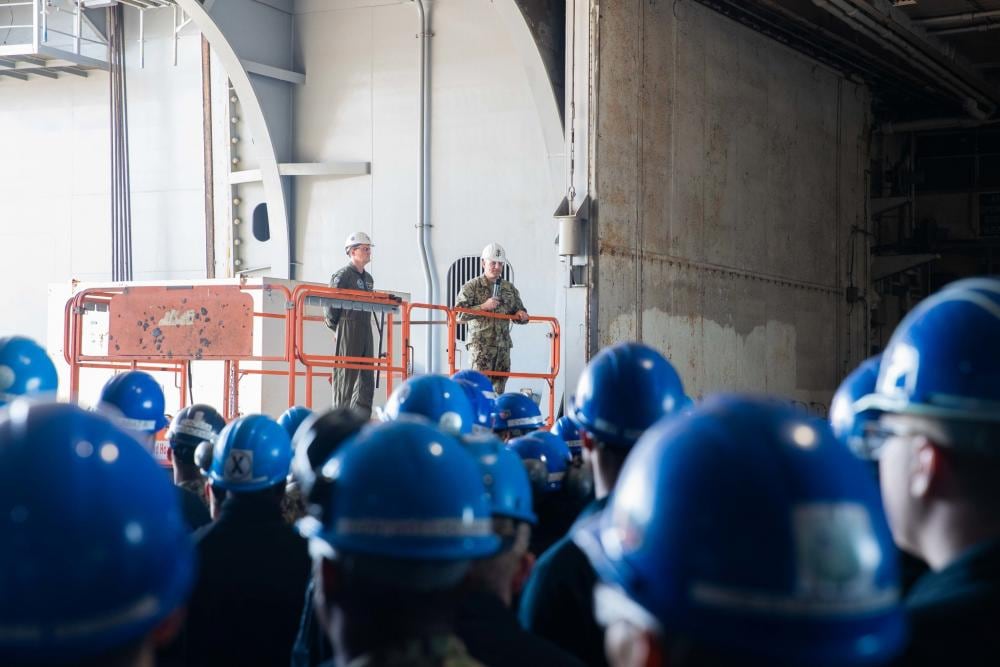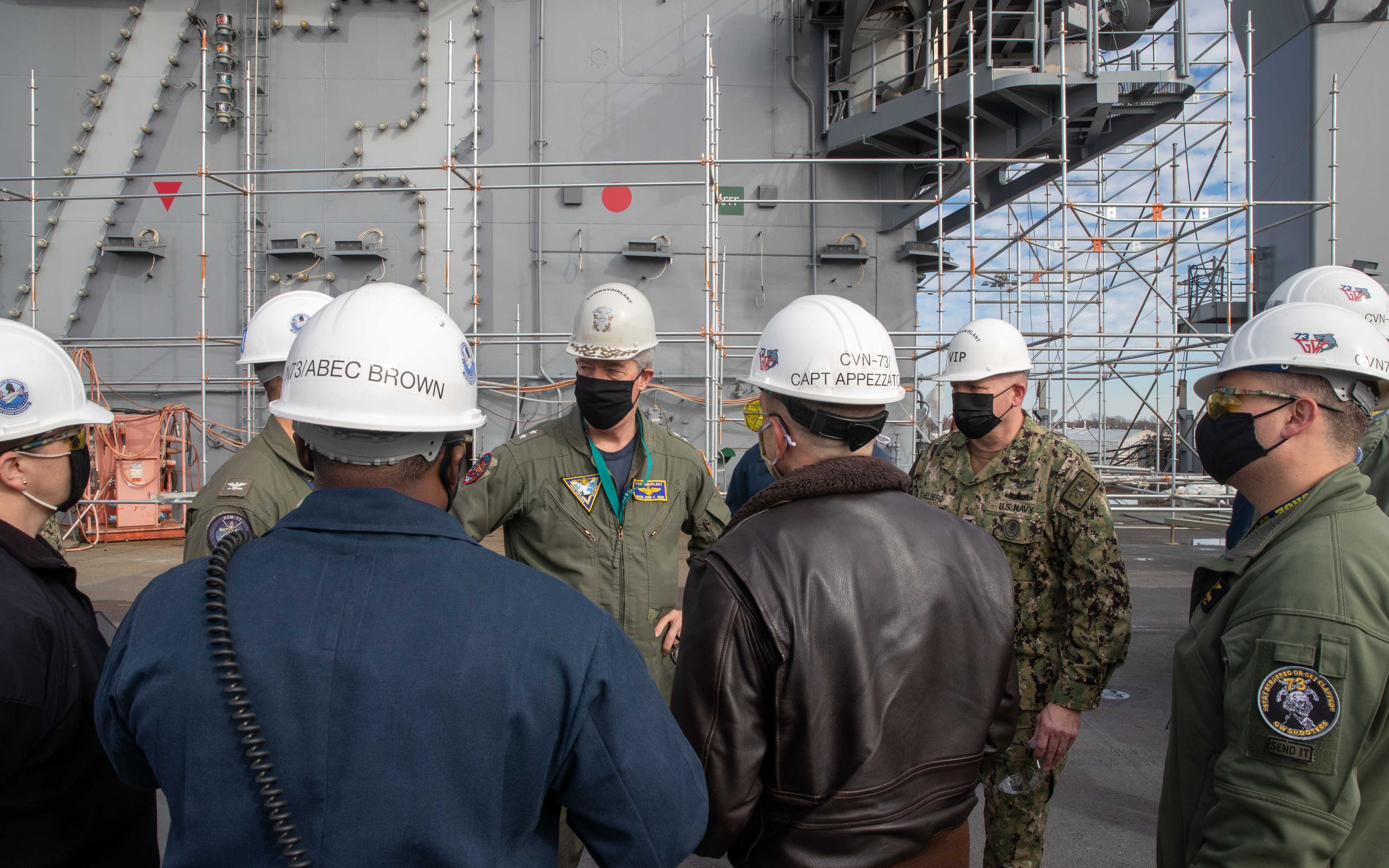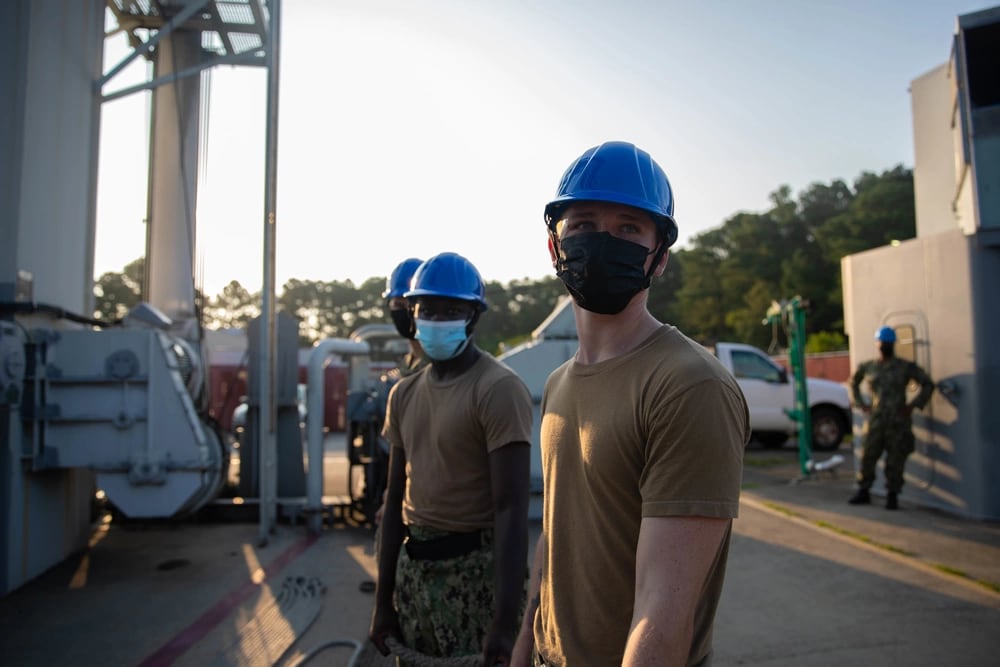The Navy parent command of the aircraft carrier George Washington is commencing investigations into both the three crew suicides last month and the unique stressors that come with operating in a shipyard maintenance environment, where the carrier and its crew currently find themselves.
GW has been undergoing a refueling and complex overhaul, or RCOH, maintenance period since August 2017, but it was supposed to wrap up last year.
Speaking with reporters Tuesday, the head of Naval Air Force Atlantic, Rear Adm. John Meier, said the ship will now not leave Newport News Shipbuilding in Virginia until March of next year.
Meier said one investigation, expected to wrap this week, will look at whether there were any immediate triggers or linkages in the April suicides of Master-at-Arms Seaman Recruit Xavier H. Mitchell-Sandor, Interior Communications Electrician 3rd Class Natasha Huffman and Retail Services Specialist 3rd Class Mika’il Rayshawn Sharp.
“To lose three sailors in such a short time is devastating,” Meier said. “We don’t take that lightly.”
RELATED

The second, broader investigation will be helmed by Meier’s deputy, Rear Adm. Bradley Dunham, and will take a look at “systemic stressors to working in the shipyard environment.”
Among the topics to be investigated are policies for having sailors live aboard the ship while it is in maintenance and parking issues that create “significant transit times” for sailors while their carrier is in the yard.
GW is also suffering from a shortage of chiefs among the ranks, the types of senior enlisted leaders who are the frontline for spotting junior sailors who might need some help.
Chief petty officer manning on the carrier stands at 65 percent, Meier said, while the junior sailor population is at roughly 95 percent of billets.
Meier noted that those junior sailors are the “most at-risk population” when it comes to adapting to military life and processing the shipyard realities.
While a carrier undergoing such an overhaul will inevitably be manned to a lesser extent than an operational ship, Meier said Dunham’s investigation will look at this “distribution process.”
“This is one of the focal points of the investigation,” Meier said. “How do we man a ship in (refueling and complex overhaul)?”
Asked whether either of those probes will be made public, Meier said that is a decision which will be made above his paygrade, and that the investigations will be sent up to U.S. Fleet Forces Command and Chief of Naval Operations Adm. Mike Gilday.
“That will be a pretty high-level decision in the Navy,” Meier said.
Roughly 400 mostly junior sailors were moved back onboard starting in April 2021 as the ship continued to undergo extensive maintenance.
But in light of three GW sailor suicides last month, and increased public scrutiny regarding conditions aboard the ship, about 260 of those sailors were given the chance to move into barracks aboard Norfolk Naval Shipyard this week, although Meier noted that not all those sailors have taken the Navy up on that offer.
“Not every sailor necessarily wants to move,” he said. “That rack is their little piece of home or privacy aboard the ship.”
RELATED

Echoing what GW sailors have told Navy Times in recent weeks, Meier noted that sailors have to walk 45 minutes from the ship to the parking lot, and that some spend up to three hours a day getting to and from work.
And while Meier described GW as “habitable,” despite occasional planned and unplanned power and water outages, he said the Navy is looking into increased Wifi access and cell phone signal boosters that would make the quality of life better for those junior sailors living onboard during the overhaul.
The Navy has also flooded the ship with additional mental health professionals and other resources to help GW’s sailors and assess broader issues impacting them.
A department-by-department work pause is also being planned, Meier added.
“I’m a lot less concerned right now about the schedule and ships force work,” he said. “I’m much more concerned about the mental health of the crew, the workload on the crew and how we move forward from that.”
During his call with reporters Tuesday, Meier spoke of losing one of his sailors to suicide earlier in his career.
“Late one night, I talked to a sailor,” he said. “I remembered him well … the next day, that sailor texted one of his shipmates and told his shipmate goodbye.”
That shipmate notified the command, which called the police, Meier recalled, but it was too late.
“I have hung on that last engagement with him, literally for 10 years now,” Meier said. “The question remains, what did I miss?”
“Maybe I didn’t miss anything,” he added. “I talked to the parents. They had the same sense.”
Geoff is the managing editor of Military Times, but he still loves writing stories. He covered Iraq and Afghanistan extensively and was a reporter at the Chicago Tribune. He welcomes any and all kinds of tips at geoffz@militarytimes.com.





